The GOP Waiting Game
Rudy Giuliani still leads among Republicans in the race for the presidential nomination, but a lurking powerhouse candidate like Chuck Hagel, armed with a popular take on the war, could quickly emerge a winner.WASHINGTON — Why not Chuck Hagel? For that matter, why not Fred Thompson?
For Republicans, 2008 promises to be a disconcerting if exciting year because for the first time since the 1964 Goldwater insurgency, the party is struggling over its philosophical direction. The old conservatism is in crisis, Bush Republicanism (of the son’s variety but not the father’s) is a tainted brand, and no candidate has emerged as the Next New Thing that the party wants or needs.
That’s why Hagel, the Nebraska senator and Iraq war critic, suggested Monday that he might seek the presidency. It’s why Thompson, the actor and former senator from Tennessee, said on Fox News the day before that he was “giving some thought” to joining the race. And who knows whether Newt Gingrich will get in?
Hagel was onto something when he spoke of the country “experiencing a political reorientation, a redefining and moving toward a new political center of gravity” and of our current problems “overtaking the ideological debates of the last three decades.” And he hinted that he might seek the White House as an independent. “This movement is bigger than both parties,” he said, tantalizingly.
The Hagel Hint and the Thompson Tease are disturbing news for former New York Mayor Rudy Giuliani, the front-runner in the polls. Giuliani’s strength is as the remainder candidate. He is drawing support from Republicans who can’t bring themselves to back the previous front-runner, Sen. John McCain of Arizona, or former Massachusetts Gov. Mitt Romney, who has a lot of party establishment support but hasn’t made the sale because of too much obvious flip-flopping.
This should be an opening for the conservative dark horses, former Gov. Mike Huckabee of Arkansas and Sen. Sam Brownback of Kansas. But they have been unable to fill the void on the right, perhaps because even traditionalist conservatives reluctantly sense, as Hagel does, that the old formulas aren’t working.
Giuliani, effectively our stand-in leader early in the week of Sept. 11, 2001, while President Bush was finding his footing, provides a safe parking place for Republican seekers. But Giuliani’s core weakness may not be any of those most widely discussed: the fact that he supports legal abortion and gay rights, his divorces, his strained relations with his children. His real problem is that his discourse is still rooted in the immediate post-9/11 period, even as the country has moved on.
No, the country has not forgotten that day and it still wants to fight terrorism. But a lot has happened since 9/11, notably the Bush administration’s use of our collective anger at terrorists to inveigle us into a war in Iraq that most Americans now view as a terrible mistake.
The president’s tumbling approval ratings signal the electorate’s belief that tough-guy rhetoric and a go-it-alone, multiple-war approach are inadequate to the battle we’re in.
Giuliani’s candidacy is premised on reminding us of one terrible day over and over when the country is looking for more than the stern reassurance it needed during that frightening moment. A war that has weakened McCain, one of its strongest supporters, could eventually undercut Giuliani’s sales pitch.
That gives Thompson every incentive to hang around and wait, in the meantime clocking more face time as the district attorney on “Law & Order.” Republicans could be sick of their field by the time the fall season comes around, and in desperate search for a new cast.
But could Hagel successfully play as a GOP presidential candidate? In truth, his Senate voting record, according to the most recent National Journal ratings, is more conservative than either McCain’s or Brownback’s. Yet Hagel’s foreign policy views are far closer to those of the first President Bush and Colin Powell’s than to the current president’s, and that’s why he can’t stand what’s happened in Iraq.
Even within the Republican rank and file, there’s disillusionment with the war. A Pew Research Center survey last month found that only 51 percent of Republicans thought things were going “very” or “fairly” well in Iraq, down 26 points in a year.
But disillusionment is not the same as rebellion. Republicans, usually not a band of rebels, still pray that Bush can succeed in Iraq. Thus Hagel waits, hyping a non-announcement to say he’s around if the world and the party move his way. What he really wants is to overturn the foreign policy of Bush 43 and restore the old-fashioned Republican approach of Bush 41. He may have to split his party and run as an independent to do it.
E.J. Dionne’s e-mail address is [email protected].
© 2007, Washington Post Writers Group
Your support matters…Independent journalism is under threat and overshadowed by heavily funded mainstream media.
You can help level the playing field. Become a member.
Your tax-deductible contribution keeps us digging beneath the headlines to give you thought-provoking, investigative reporting and analysis that unearths what's really happening- without compromise.
Give today to support our courageous, independent journalists.

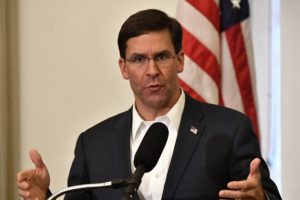
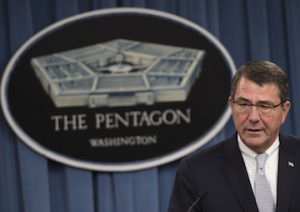

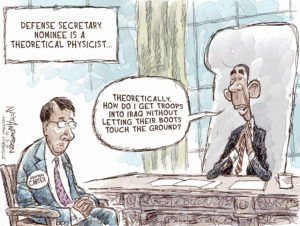
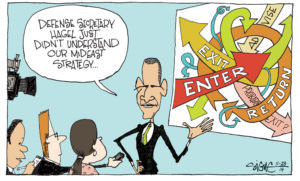
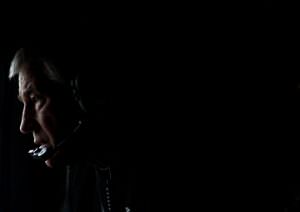


You need to be a supporter to comment.
There are currently no responses to this article.
Be the first to respond.